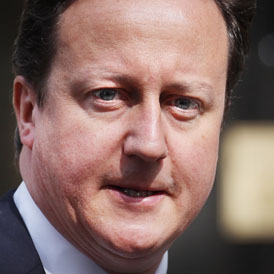Universities: Cameron pledges no ‘pay for access’
As the Government is accused of its fastest U-turn, the Prime Minister tells Channel 4 News that – despite “noises off” – the Coalition is still providing “strong and decisive” leadership for Britain.
Interviewed by the Channel 4 News Political Editor, Gary Gibbon, David Cameron insisted that access to Britain’s universities would remain on the basis of “the ability to learn, not the ability to pay”.
His pledge was designed to end the political firestorm that had blown up over an interview given to the Guardian newspaper by the Universities Minister, David Willetts, which the newspaper interpreted as suggesting that teenagers from the wealthiest families would be able to pay for extra places at the most competitive universities.
In an interview with the BBC Today programme, Mr Willetts passed up the chance to play down the reports and it was only later that he issued a statement saying that the Government would not approve any scheme enabling wealthy students to “buy” places.
By then, the Labour Party had already tabled an emergency question forcing the Minister to go to the Commons and make his policy clear to MPs.
Mr Willetts insisted that the Government was looking only at allowing private firms and charities to “sponsor” students. “Of course, rich individuals should not be able to buy their way into university,” he added, to Labour jeers.
“There is absolutely no question of people being able to buy their way into university.” David Cameron
Labour’s Shadow Business Secretary, John Denham, said Mr Willetts had been forced to climb down over the policy. “It is the most humiliating and fastest U-turn in the history of this discredited Government,” he declared

And in his interview with Gary Gibbon, the Prime Minister did nothing to dismiss the suggestion that Number Ten had intervened.
“He (Mr Willetts) has made absolutely clear – and let me make clear on behalf of the whole Government – that there is absolutely no question of people being able to buy their way into university,” said Mr Cameron. “Access should be based on ability to learn – not ability to pay. That has been made completely clear.”
The Prime Minister also suggested that the Government would press on with NHS reforms. “Standing still” was not an option, but the pause in the progress of the NHS Bill would help Ministers ensure they had got it right, he said.
On the eve of the first anniversary of the formation of the Coalition, Mr Cameron insisted that the Government had “good achievements” to its name. “Is there a lot more to do? Of course there is. Did we get some things wrong? Of course.”
Asked about the row between the Conservative Party and the Liberal Democrats over the AV referendum, Mr Cameron insisted that was over and done with.
“It is a coalition. You are going to have loud noises frankly from both sides about all sorts of issues,” he said. “We have had it over the last year. We will have it in the future.
“The real question is is this Government going to get the important things done for the good of the country? Is is going to be a strong and decisive and active government?
“I would argue that, on welfare, on schools – abroad on issues like Libya, at home with issues like the deficit, this is going to be a strong and decisive government that is good for Britain.
“My concern as Prime Minister – despite any of the noises off or even the noises on – is to get on with delivering that sort of government.”
-
Latest news
-
Local Elections Debate: voters question five main parties41m

-
Local Elections: Conservatives face 400 seat loss exclusive analysis reveals4m

-
Post Office Inquiry: ‘no cover-up’ insists former executive2m

-
Scotland politics: SNP leader future in doubt after opposition move3m

-
Military horses rampage through streets of London2m

-




